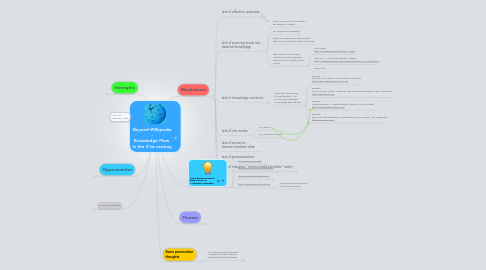
1. Strengths
1.1. stabilized knowledge
1.2. consens orientation
1.3. neutrality
1.4. crowdsource based
2. Opportunities
2.1. some new developments in the wikipedia developer community
2.1.1. wikidata initiative
2.1.1.1. Wikipedia’s Next Big Thing: Wikidata, A Machine-Readable, User-Editable Database
2.2. "Data Partnering": encouraging institutional data curation with more accurate data
2.2.1. example: having an OECD data pipe directly displaying on WP pages
2.2.2. same with reliable national + transnational institutions like NASA, WHO, statistical offices etc
3. more colored nodes
3.1. Neue Idee
3.2. Neue Idee
3.3. Neue Idee
4. SWOT of Wikipedia today
5. Some provocative thoughts
5.1. in a certain sense the wikipedia - despite the evident success - betrayed the wiki philosophy
5.1.1. the WP disconnected from the swarm of wikis all around the world
5.1.1.1. solution: start a policy of link offerings in the footer
5.1.1.2. this can be personalized - people can have the classic view too
5.1.1.3. alternative solution: kind of browser plugin realizing the "footer feature"
5.1.2. the WP community created a de facto threshold
5.1.2.1. solution: personalize "relevance" criteria
5.1.3. the WP kind of monopolized knowledge
5.1.3.1. open up to the community and find some new WP editors
6. Weaknesses
6.1. lack of effective openness
6.1.1. gatekeeper / high entry
6.1.2. edit wars
6.2. lack of zooming levels into detailed knowledge
6.2.1. only a minor share of the world's knowledge is covered
6.2.2. no "long tail of knowledge"
6.2.3. (there are many serious wikis around, that are not connected to the WP articles)
6.2.4. why doesn't WP have links into the rest of the wikiverse? some are more in depth about a topic.
6.2.4.1. List of wikis http://en.wikipedia.org/wiki/List_of_wikis
6.2.4.2. Wiki List - A List of Wiki Sites by Category http://webtrends.about.com/od/wikilists/tp/list_of_wiki_sites.htm
6.2.4.3. Neue Idee
6.3. lack of knowledge continuity
6.3.1. users often are looking for practical help - WP is in no way connected to knowldge bases for this
6.3.1.1. Example wikiHow - The How-to Manual That You Can Edit http://www.wikihow.com/Main-Page
6.3.1.2. Example eHow | How to Videos, Articles & More - Discover the expert in you. | eHow.com http://www.ehow.com/
6.3.1.3. Example WatchKnowLearn - Free Educational Videos for K-12 Students http://www.watchknowlearn.org/
6.3.1.4. Example 5min - Find the best how to, instructional and DIY videos – Life Videopedia http://www.5min.com/
6.4. lack of rich media
6.4.1. e.g. video
6.4.2. e.g. interactive tutorials
6.5. lack of access to dynamic/realtime data
6.5.1. no integrated realtime scanning and tracking of news
6.6. lack of personalisation
6.6.1. concerning skill level
6.6.2. concerning interest profile
6.7. lack of mapping "controversial/pluralistic" reality
6.7.1. alternative format to hiding controversy behind the scenes
6.7.1.1. there could be a main article plus two articles with the antagonistic positions
6.7.2. no question that this format should be the exception, not the rule
7. Threats
7.1. new ecosystems for knowledge communication competing with WP
7.2. sinking motivation to contribute in the editing
8. Some first inspirational Elements for an "Advanced Wikipedia"
8.1. http://www.quora.com/
8.1.1. for more fine-grained and practical knowledge content
8.2. http://datajournalismhandbook.org
8.2.1. for better knowledge transfer; increasing understanding when using data visualisation
8.3. http://www.wolframalpha.com/
8.3.1. automatic knowledge generation
8.4. http://debatepedia.idebate.org/
8.4.1. mapping the whole picture of controverse topics
